Backpacking in Portugal
Portugal combines modernity and classicism in a harmonious way. But not only that. Portugal is also a link between Europe, South America, Africa and the Orient. As a great former seafaring and cultural nation, the country has played in the highest league for centuries before it fell into economic, cultural and political oblivion. In one area, however, Portugal still plays an important role – tourism. Because of its breathtaking scenery, which includes secluded beach bays, rugged rocky regions, meandering rivers through the wide plains and high mountains, backpackers and other visitors flock to the country. In addition, there is the cultural-historical aspect, which can still be seen in old castles, palaces and castle ruins.

Portugal – Beach
Two of the most popular travel cities in Europe are Porto and Lisbon. Few metropolises in Europe can inspire with such a charm, which probably comes firstly from the population mix and secondly from the cosmopolitanism of the inhabitants. Getting to know Portugal and the Portuguese means taking your time and being flexible. But while exploring the country you will come across fascinating coasts and regions that can be explored on foot, by horse, by bike, by bicycle or by bus.
Take a look at the numerous UNESCO World Heritage buildings and sights or enjoy an incomparable sunset over the Atlantic Ocean. You don’t have to do without the latest technology WLAN hotspots to stay in touch with your family or buddies, you’ll find everywhere. ATMs to get cash, too. Portugal is considered one of the poorest countries in the EU, but the Portuguese are proud of it. So watch out and don’t get arrogant.
In some regions of the country you will find yourself in Europe’s warmest regions. 350 days of sunshine a year are not uncommon. But what may please backpackers is a hostage for the local agriculture. Without water nothing grows. Go to places worth seeing like Viana do Castelo, Braga, Guimar Espinho or Figueira da Foz, Costa de Prata to explore and try the countless palate temptations of the country. Port wine is at the forefront.
As far as travel and living expenses are concerned, you won’t have to reckon with a big budget. You can only travel cheaper than in Portugal to the far east of Europe. Calculate between 30 and 50 Euro per day, depending on the standard, for your backpacking adventure through Portugal. You can choose from any type of accommodation, from camping to a 6 star shed.
Culture in Portugal
As already mentioned, the Portuguese are a proud people. Few peoples in world history have left such deep traces in human culture as the Portuguese. Portuguese culture dates back to prehistoric times, when the first people scribbled their cave paintings on the walls of Escoural.
But the Romans also left their architectural and cultural traces, as did the Moors. Between the 15th and 17th centuries, the country really came to prominence as a world-class cultural nation. Travel backpacking through the land of unique Manueline art and listen wherever possible to the world-famous sounds of fado, which symbolize the Portuguese like no other expression. But you can also look forward to a hospitable people who will welcome you with open arms and hearts.
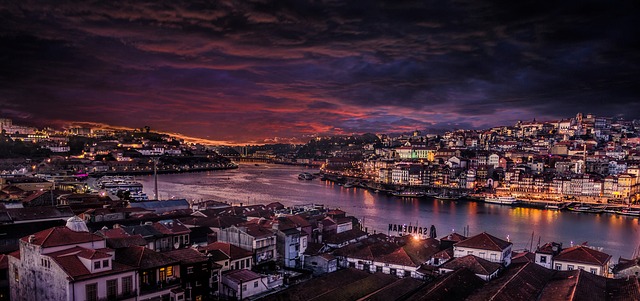
Portugal – Porto
More Backpacker information about Portugal
Portugal is cheap compared to its neighbours. With 30-50 euros a day you can come around as a backpacker. More about Backpacking costs in Portugal
Portugal offers numerous cultural and geographical highlights, which can be combined with tours and hikes. Depending on the travel time think of the right clothes. More about Backpacking Routes in Portugal
Although Portugal is one of the cheapest countries in the world, the cost of accommodation can be very high, especially in the high season. More about backpacking and accommodation in Portugal
Those of you who enjoy food and drink will get their money’s worth thanks to the many delicacies available throughout the country. More about eating and drinking in Portugal
During your backpacker tour through Portugal you should look for the true beauties of the country a little off the beaten track. More about Backpacking Tips, Highlights and Insider Tips in Portugal
As a German citizen you have no stress when entering the country. What else you need to know as a backpacker for your backpacker tour through Portugal, you can find under Visa & Vaccinations
Backpacker Route in Portugal
Backpacker destinations for Portugal are plentiful. Depending on your needs and requirements, you can choose from cultural, historical and geographical sights. Even on a three-week trip you can explore some of the country. But those who really want to get to know Portugal and its beauties should plan the long tour or even better – come back again and again. A few must-see highlights in the following.
Route 1: The classic (15-20 days)
- 3-5 days at the mouth of the Tejo to explore the capital Lisbon on seven hills
- 3-5 days experience the Algarve and get to know the port city of Faro
- 3-5 days to Madeira – but you would have to plan your own backpacker trip.
- 1 day cave walk through the Grutas Mira Deire
- 1 day Évora
- 1 day Lagos
- 1 day Elvas
Route 2: Backpacker Intensive Trip (up to 40 days and more)
- 3-5 days at the mouth of the Tejo to explore the capital Lisbon on seven hills
- 3-5 days experience the Algarve and get to know the port city of Faro
- 3-5 days to Madeira – but you would have to plan your own backpacker trip for that
- 1 day cave hike through the Grutas Mira Deire
- 1 day Évora
- 1 day Lagos
- 1 day Elvas
- 3 days through Portugal’s highest mountain range, the Serra da Estrela hiking, driving, riding.
- 3 days in Porto not only drinking port wine, but also visiting the old town.
- 3 days of wild and untouched Portugal at ParqueNacional da Peneda-Gerês
- 3 to 10 days to drive Portugal’s wine routes (running?)
- 2 days or more, depending on your preference, in the first official Surf ReserveEriceira near Lisbon
- 3 days or more of Portugal’s dream beaches experience, to the best belong among others Albufeira, Aljezur, Cabanas, Carvoeiro, Porto Santo, Caparica, Porto Santo, Lagoa, Lagos, Monte Gordo, Odeceixe, RaposeiraViladoBispo, Vilamoura and some more.
- 1 day to the world-famous pilgrimage destination Fátima
- 1 day to the extreme west of Europe – the Cabo da Roca
- 1 day to the world cultural heritage CoaValley
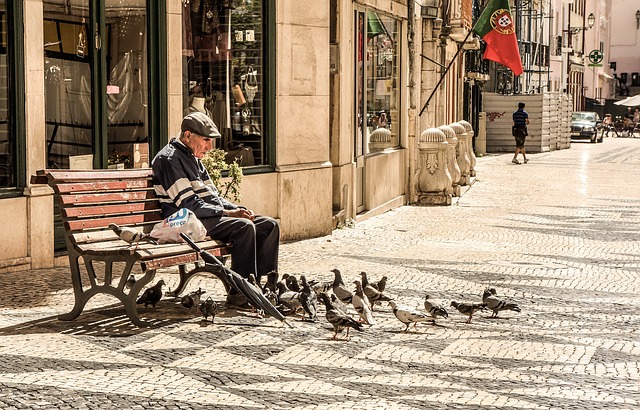
Portugal – old man
Travel times in Portugal
Is there an optimal travel time for Portugal at all? Certainly not, because the demands of the backpackers are different. Those who don’t want a lot of hustle and bustle will certainly not come in summer, even if the sun burns from the sky with 40 degrees. The autumn and spring months with their moderate temperatures are considered the most beautiful of the year.
Portugal has the warmest average temperatures on the European continent. Good weather is therefore always to be found somewhere in the country – whether in summer or winter. The Algarve on the south coast is considered to be the sunniest and driest region. But not necessarily the breeding heat in summer is everyone’s cup of tea. Far more pleasant at this time of year are the central and northern regions.
Backpacker Budget in Portugal
Thanks to the low cost of living, you only have to plan on a fraction of the travel budget that you have to calculate for travelling to neighbouring European countries. In a small restaurant you can get a delicious local meal for just 5 euros. You’ll have to put down a little more in a middle-class shop. If it has to be McDonalds, then you pay almost the same price as anywhere else. Half a litre of local beer costs you 1.50 €. Import beer isn’t more expensive either. If you treat yourself to a cappuccino, it costs around 1 Euro. You pay the same amount for a Coke or/Pepsi.
A bus ticket in the city costs one and a half euros. A monthly pass of about 35 Euro. For the taxi you pay 3.5 Euro for the journey and then half a Euro per kilometre driven. If you’re on the road in summer, it’s hardly worth taking large luggage with you. The heat and the lack of rain don’t make this necessary. That saves travel and luggage costs.
Bus driving in Portugal
The best and cheapest way to get around the country is by bus. The train connections are too limited to get anywhere. You can find out which price you have to pay for which route at rede-expressos.pt. The site is also available in English and French. Get more information in English about the Portuguese bus system at algarvebus.info. There you can also find some websites with local bus companies and their services. You can also find out what the price is for the route from Lisbon via Torres Verdas and Praia Areira Branca to Peniche, which takes a long time. A bus pass and Interrail are options.
Domestic fares in Portugal
A domestic flight is certainly an alternative if you want to travel quickly from the south to the north. Or from the Algarve to the capital. As everywhere, domestic fares change hourly, so the best thing to do is check out the Portuguese airline websites for current fares. Domestic flights for your backpacker trip include Aero VIP, EuroAtlantic Airways, Hifly, Masterjet, NetJets Europe, Omni – Aviação e Tecnologia, Orbest, Portugália, SATA Air Açores, SATA, TAP Portugal and some others.
Rail travel in Portugal
Travelling by train in Portugal is more of an adventure than a locomotion. But it is worth exploring the country with historic trains. On the website www.interrail.eu/trains-europe/trains-country/trains-portugal you get a deeper insight into the offer of train connections in Portugal. You don’t usually need to make a reservation. With an Interrail Pass you are well advised. But only if you move on.
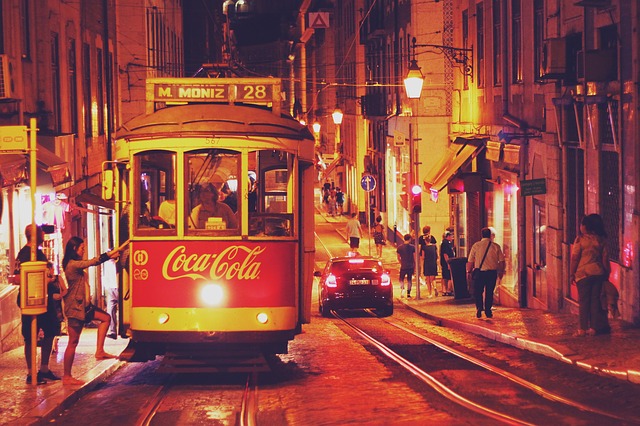
Portugal – Public transport
Backpacker accommodations in Portugal
As a backpacker you are spoilt for choice when looking for a suitable accommodation. There is almost every type of stay in Portugal, depending on the budget available and your personal requirements. You can book a bed in a simple, cheap hostel accommodation for around 10 Euros or stay in a budget hotel for 20 to 50 Euros. Other variations are noble luxury hotels of the international chains or the cute, but partly also expensive Posadas typical for the country. Quintas are also an option.
However, the overnight prices fluctuate strongly in the respective season. In the summer months it can become really expensive, since the country is a popular destination in Europe. So be sure to look for a place to stay in a rustic country house in dreamy fishing nests or tranquil villages in the hinterland with a lot of local flair.
The private Quartos Particulares, with family connection, are inexpensive. Overnight stay alternatives are the guesthouses, which are called Pensão in the local language, and are also popular with the locals. Pensions are considered the cheaper alternative to hotel accommodation and have more flair.
Hostels and youth hostels are called Pousadas de Juventude in Portuguese. The overnight prices for a bed in a dorm of a hostel in Portugal are according to a statistic in the hostel portal hostelworld com as follows:
- €26.39 Lisbon
- €16.34 Postage
- €19.40 Lagos
- €20.77 Faro
- €16.07 Coimbra
- €19.38 Sintra
- €20.80 Albufeira
- €15.14 Peniche
The overnight stay is not very cheap, especially in the high season. Prices can drop by half already in the low season.
Camping in Portugal
Of course you can also camp during your backpacking trip through Portugal. But you should know that wild camping is not only not welcome, it is also not allowed. The ban also has a lot to do with the danger of forest fires, which is especially high in the southern parts of the country during the hot months. Otherwise you will find good to very good campsites throughout the country for a handful of euros. But also on the campsites it can get full in summer.
Backpacker Trips, Tips & Highlights in Portugal
Portugal has huge potential for almost every taste in terms of adventure, backpacking, gourmet, lifestyle, shopping and culture. Whether you hang out on dream beaches, surf the wild Atlantic, visit interesting cultural monuments or enjoy the multifaceted nightlife in Lisbon or Porto, you won’t be bored on your backpacker tour.
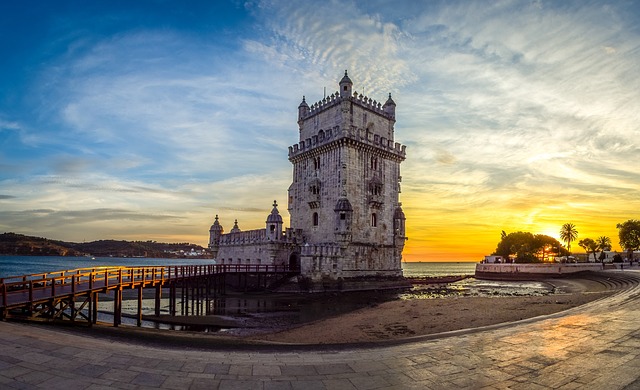
Portugal – Belem Tower
Backpacker Highlights in Portugal
One of the absolute highlights in Portugal is the tasting of national specialities, with port wine at the forefront and local fish and seafood dishes. Start a tour along the wine routes of Portugal and get to know cuddly dreamy wine nests and the local culture at first hand.
And if you haven’t been a beach fan yet, you will certainly be when you see bays and beaches such as Espinho on the Costa Verde, Figueira da Foz, near Coimbra on the Costa de Prata, or in Peniche. Further hammer beaches can be found in the Praia das Maçãs, in Zambujeira do Mar, as well as in the Praia da Rocha, the Praia dos Pescadores and the Praia do Castelo.
It’s worth visiting the medieval town of Monsaraz, where you can still stay in ancient hostels. It’s almost like Venice when you take a canal trip through the lagoon city of Aveiro.
Backpacker insider tips in Portugal
A real insider tip is to explore the wine valley Peso da Régua by train or boat. Sports enthusiasts can rent a bike and cycle along the Algarve coast. You can also kayak down the Mondego River. Those who are looking for an especially sweet treat will have to go to Belen, where the small Pasteis de Belem await you. The wild and untouched Portugal can be found in the Penda Geres National Park. If you can surf properly, that means to ride 20 m high waves, you have to go to Peniche. The biggest crushers of the world are waiting to be ridden. Spectacular is the dolphin watching in the Sado. That Portugal can also be mountainous and quite cold, you can find out on a side trip to the Serra de Estrela, where Portugal’s highest mountains rise.
Food & Drinks in Portugal
The Portuguese love to eat and drink with pleasure. Best in the presence of many friends or the whole family clan. If you are lucky enough to be invited to such a celebration, then be prepared for a real taste firework. The typical cuisine is simple, tasty and very varied.
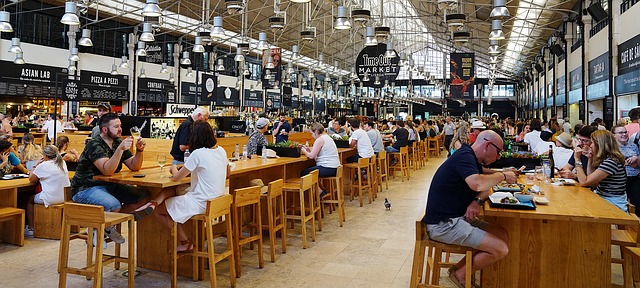
Portugal – food court
Food in Portugal
Seafood of every kind and shape plays a major role in the composition of the dishes. In addition there are beans. While in the north the strong dishes are preferred, in the south the dishes are much lighter. Thus a border between meat and fish consumption can be determined. Where it is colder, meat is preferred to fish. Beans, however, are everywhere on the table and that in various forms. The dishes are prepared very healthy and tasty with good olive oil. Who wants to do something for his belly circumference during his backpacking trip through Portugal, should not have it difficult to gain a few pounds, thanks to the many seductive and calorie-containing desserts, the so-called Petiscos.
The Portuguese also know something about baking bread. A delicacy is the rye bread from Chaves. Caldo verde soups are light and tasty in the area between Douro and Minho. Those who like seafood must try an Amêijoas à Bulhão Pato, which are mussels, in onions, garlic and white wine broth. A Leitão assado à Bairrada is then again fatter and stronger. But the suckling pig speciality from the Bairrada region is not for everyone. Cheese fans must try the sheep cheese from Serra da Estrela. You can also fill your stomach with fast food in the international chains that you will find mainly in the tourist centres and the big cities. But the local cuisine has much better things to offer.
Drinking in Portugal
Portugal is a wine country and not only that. The country is famous all over the world for its incomparable port wine. Alone 500 native grape varieties grow on the long stretch of land at the Atlantic kitchen. So there are enough wine varieties to try. If you want it even stronger, you can try the hard liquors (aguardente) and liqueurs on your backpacking tour. Strong sour cherry brandies and Macieira brandies are exclusive drinks that you don’t get everywhere. Well-known and quite tasty beers are Super Bock and Sagres. You will also find the famous imported beers on the market.
Backpacker Visa and Vaccinations in Portugal
As part of the EU, as German citizens you usually have little difficulty visiting the country. Nevertheless, your travel documents should be up to date. According to the German Foreign Office, you will need the following documents in order to move freely around the country. Entry is possible for German citizens with the following documents:
- Passport: Yes
- Provisional passport: Yes
- Identity card: Yes
- Temporary identity card: Yes, must be valid.
- Children’s passport: Yes
- Still valid child ID according to old model: Yes
Medical information & vaccinations
If you want to go to Madeira or the Azores, you will need to have a valid yellow fever vaccination in case you come from a yellow fever area. You should have the usual vaccinations. Moreover, Madeira Dengue is known to have a fever. However, there is not yet malaria in any Portuguese areas.
